Message from the CEO
The improved result for the year was largely attributable to a robust Norwegian market characterised by efficient operations and production. The market situation proved more demanding in Sweden, where in particular some medium-sized regional grid projects made significant losses, and unfortunately to the detriment of Infratek’s overall operations in Sweden. Despite this, the operating result improved by 6.3 percent in 2012 and the Group is on track to achieve its long-term results target of EBIT of over five per cent.

The Norwegian market improved. Buoyant sales, efficient operations and a focus on profitability at all stages of operations generated sound earnings and historically strong results. In particular Local Infrastructure turned in a highly satisfactory performance. It was also pleasing to note that the Security business posted improved year-on-year results in every month in 2012. Consequently, the Norwegian business enters 2013 with an improved market position.
The Swedish business was strongly impacted by losses on some projects, which led to weaker results for the year than expected. The measures that were implemented in the second half of the year had a positive impact, and we are confident that things will continue to move in the right direction in the future. It was particularly satisfying to see our focus on Statnett and Svenska Kraftnät reaping rewards, and receiving positive feedback from our customers.
The Finnish business enjoyed a satisfactory year in its home market. Its expertise also played a key role in allowing the Group to establish itself with major transformer projects in both Norway and Sweden. This is consistent with the company’s long-term strategy of leveraging its collective expertise across the entire Nordic region.
A number of changes were made to staff and support functions in 2012 in order to strengthen human resources and joint management systems. One example was the establishment of a new Group function, People & Safety, which will further raise the profile of strategic personnel development and safety throughout the Group. In parallel with this, our “structural capital” was incorporated within Finance & Business Systems. Joint management of systems, processes and routines will help the company to achieve its objective of establishing ONE Infratek, in addition to securing a more robust management model along with improved internal controls. These changes will also facilitate further organic and structural growth. Future integration processes for new business will be more efficient and involve lower risk.
The Infratek brand arises from interaction between our employees and customers. Happy, motivated and suitably skilled employees make a crucial contribution to the company’s competitiveness. Through our management development programmes and focus on skills development, we continually strive to attract, develop and retain the right personnel. Profitability and further growth are dependent on deliveries, the ability to innovate and high levels of customer satisfaction. The Infratek brand stands for quality in all stages of operations, and will continue to do so in future.
In Norway construction and operation of critical infrastructure continues to be characterised by low levels of industrial developments, with many stakeholders adopting a wait-and-see approach pending new political initiatives. Against this background, it is pleasing to register a growing political will to amend the framework conditions for grid companies, which will hopefully result in sensible changes in the structure, and more efficient solutions for society. Developments in Norway are in stark contrast to Sweden and Finland, where long-term targets and cutting-edge industrial solutions are crucial to market developments.
Our primary long-term focus remains unchanged. Our core business comprises the construction, operation and securing of critical infrastructure. Infratek will grow in line with new investments and will be ready when new markets are deregulated, as illustrated by the company’s successful venture into the operation and maintenance in the Swedish railways sector. We believe that this market will eventually be deregulated in Norway. In the next few years the general prospects for further growth will lie in Sweden, but we remain optimistic and are encouraged by glimpses of the necessary changes in the Norwegian market – even if the pace of these is all too sluggish.




